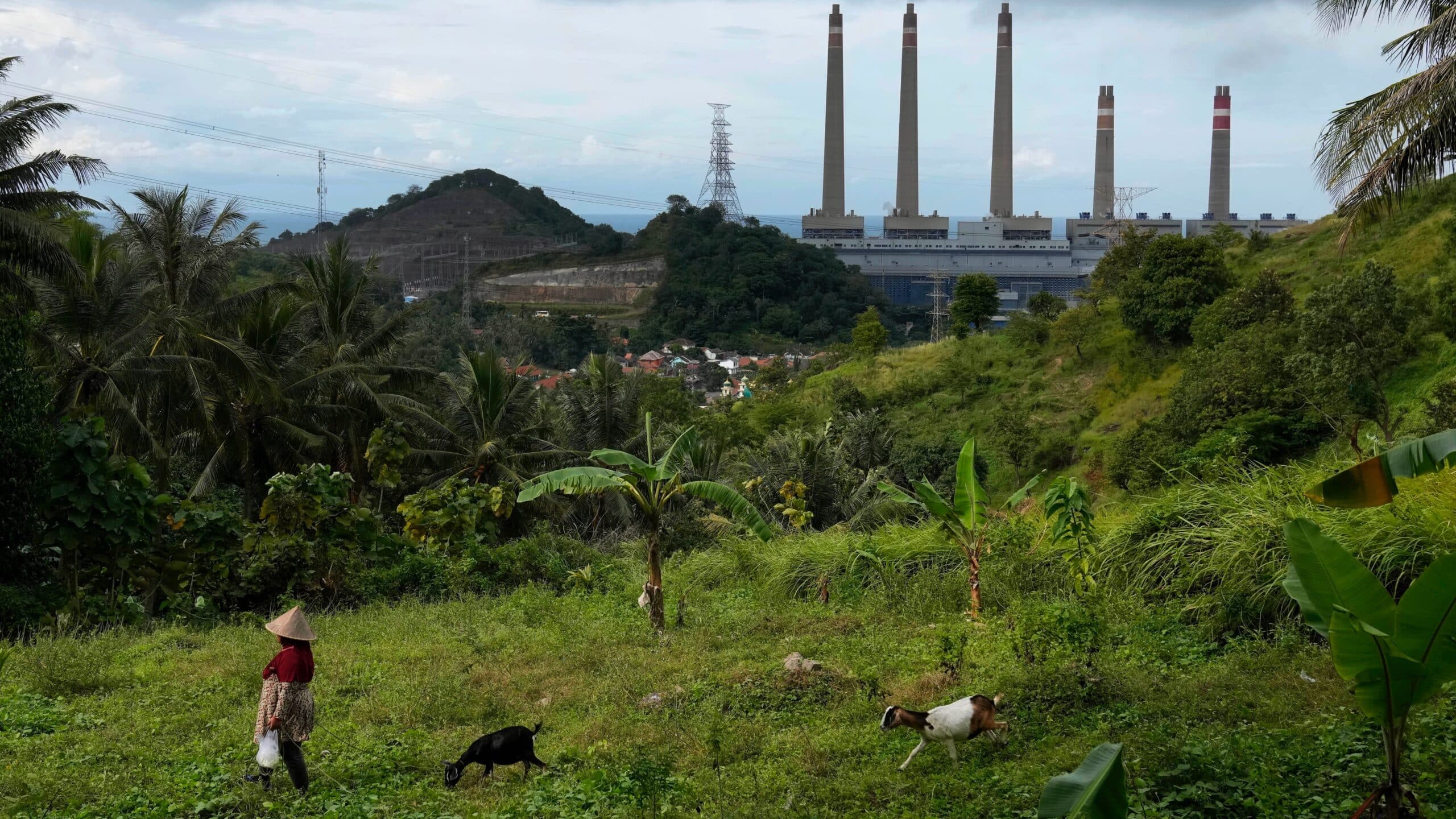Billions in international funds have gone to weaning the populous nation off coal. But the country continues to build coal plants despite its pledge to go green.

A woman leads her goats as Suralaya coal power plant looms in the background in Cilegon, Indonesia, 8 January 2023. (AP Photo/Dita Alangkara)
Across the wide bay, past wooden fishing boats, a large column of smoke rises against a backdrop of tree-covered mountains as it has done 24 hours a day for the best part of a decade.
In another decade or so, the flames that produce that endless plume at the coal-fired power plant in the small fishing port of Pelabuhan Ratu in western Indonesia will finally be extinguished.
And the convoy of coal barges that cross the bay to feed it will stop coming.
At least that’s the theory under a hugely ambitious, internationally-funded project signed late last year and worth $20 billion to wean Indonesia off coal-fired power.
Exactly how it will work is less clear. A state-controlled coal miner is taking over the Pelabuhan Ratu plant.
Coal comes with long-term costs.
The purpose of the project is simple enough. Indonesia has been desperate to provide more power to help lift up the economy of the world’s fourth largest population.
It also has enormous reserves of thermal coal — coal used to generate electricity. That has made it pretty obvious how to provide all that new energy.
It now has almost 100 coal-fired power plants.
Those plants have also helped make Indonesia one of the biggest sources of greenhouse gas in the world (ranked eighth globally). The air quality in the capital Jakarta, which is also sinking, is among the worst of any city.
Its archipelago of thousands of islands strung along the equator in southeast Asia hold one of the world’s biggest tropical forests that are home to more varieties of insects, animals and plants that exist almost nowhere else.
From thermal coal to geothermal power
The backers of the fund to de-coal include countries which themselves are major polluters and, like the UK, have little forest left of their own.
A history of rampant corruption, incompetent bureaucracy and flagrant large-scale deforestation inevitably raise red flags over how likely Indonesia is to honour its side of the deal to shift away from coal and into renewable sources of energy, including a seemingly limitless potential for geothermal power.
The government insists it is serious and is committed to reaching net-zero emissions in less than 40 years time.
In March, President Jokowi Widodo launched construction of a $2.6 billion hydropower plant in North Kalimantan. He said he hoped Indonesia really would transform into a green economy.
To make that transition, Indonesia will have to make significant changes to encourage the use of renewable energy, wrote Anissa Suharsono, an energy policy associate with the International Institute for Sustainable Development.
She noted that by the end of 2021 renewable energy accounted for only 11.5% of the country’s energy mix.
“Without serious reforms to remove structural barriers to renewable energy deployment the deal will not succeed, and without a method for balancing the social and economic benefits of projects the transition may not be as ‘just’ as intended,” Suharsono wrote.
Moving from massive polluter to net-zero emissions
However, there are signs that changing attitudes in commercial finance may also help the drive for change.
The Financial Times reported in February that one major Indonesian mining company was struggling to raise funds to build a new aluminium smelting plant, initially using coal, because international banks were now reluctant to be seen financing the use of fossil fuels.
And while the current Indonesian president is pushing for change, he won’t be in the job much longer. It is far from clear if his successor next year will bring a similar commitment, given the influence of the wealthy coal lobby.
In the meantime, residents in the fishing port of Pelabuhan Ratu continue to complain about the impact of their local power plant which is in the centre of a UNESCO-designated geopark.
According to the U.N. Agency’s website, a geopark is home to sites of international geological significance “managed with a holistic conception of protection, education and sustainable development.”
Locals say pollution from the plant and coal falling from barges into the sea has severely cut into fish stocks.
“They sometimes have to bring fish in from other places to sell in the fish market,” one local official said.
Three questions to consider:
- Why is it important that Indonesia stop using coal to produce energy?
- Why would Indonesia continue to build coal plants while getting international funding to get off coal?
- What are some alternatives to coal that Indonesia is turning to for energy production?

Jonathan Thatcher is former Reuters bureau chief for Indonesia and East Timor. He was also bureau chief in Korea, the Philippines and Russia. During more than 37 years in journalism, he was also based in Japan, Hong Kong, Singapore, Australia and Britain, and reported from Thailand, India, Bangladesh and Afghanistan.
